|
|
|
Sort Order |
|
|
|
Items / Page
|
|
|
|
|
|
|
| Srl | Item |
| 1 |
ID:
085950
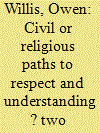

|
|
|
|
|
| Publication |
2009.
|
| Summary/Abstract |
While trends towards secularization may have appeared inexorable as the last century came to a close, more recent events, particularly in the aftermath of 9/11, have led to greater attention being paid to the resurgence of religion globally. But how to represent and portray religion, with respect and understanding, in this new environment may contain significant challenge-a subject which this paper considers in the light of two recent Commonwealth Reports. The Report of the Commonwealth Commission on Respect and Understanding, entitled Civil Paths to Peace, chaired by Amartya Sen, and presented recently to the Commonwealth Heads of Government summit in Kampala, Uganda, seeks to downplay any single-minded concentration on religion in favour of promoting broader civil engagements in crafting civil paths to peace. In contrast, the Commonwealth Foundation's Report, Engaging with Faith, treats religion more sympathetically and encourages understanding and cooperation between the faith communities. The former Report may tend to treat religion as part of the problem, while the latter might view religion as part of the solution. Thus, the two Reports illustrate contrasting and conflicting views as to the place of religion in efforts to promote global peace and development along the path to respect and understanding.
|
|
|
|
|
|
|
|
|
|
|
|
|
|
|
|
| 2 |
ID:
085956
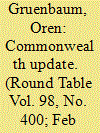

|
|
|
|
|
| Publication |
2009.
|
| Summary/Abstract |
The Awami League swept back to power in Bangladesh's first elections since a state of emergency was imposed in 2007. India accused Pakistan of aiding the Islamist terrorists who carried out the Mumbai attacks. South Africa's ruling African National Congress (ANC) split and corruption charges were revived against the ANC leader and putative next president, Jacob Zuma. Sri Lanka's army seized the Tamil Tigers' de facto capital and the country's leading journalist was assassinated. International euphoria over the election of Barack Obama as US president was tempered by the unfolding global recession; the US led the way, with 530,000 jobs lost in November.
|
|
|
|
|
|
|
|
|
|
|
|
|
|
|
|
| 3 |
ID:
085955
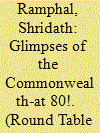

|
|
|
|
|
| Publication |
2009.
|
| Summary/Abstract |
" A Passing Glimpse is how Robert Frost titled his poem that inspires my words tonight. Do you remember them? In the context of 'glimpses' how can I start better than by recalling that exquisite verse.
|
|
|
|
|
|
|
|
|
|
|
|
|
|
|
|
| 4 |
ID:
085954
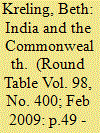

|
|
|
|
|
| Publication |
2009.
|
| Summary/Abstract |
As an Indian Secretary General takes up the reins of the Commonwealth this analysis looks back to the symbiotic birth of India and the modern Commonwealth in 1947-1949. It asks whether we can learn anything from the decision-making process that brought them together initially that might inform our comprehension of their current relationship and the opportunities for further contemporary engagement.
|
|
|
|
|
|
|
|
|
|
|
|
|
|
|
|
| 5 |
ID:
085953
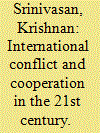

|
|
|
|
|
| Publication |
2009.
|
| Summary/Abstract |
The rise of modern institutional multilateralism is a phenomenon dating back less than a hundred years, and there is no reason to infer that it is either immutable or permanent. With the end of the Cold War, there was an expectation of global consensus and the implementation of collective security. But this depended to an excessive extent on the United States and its willingness to use force, and the level of subjectivity in US-led interventions gave rise to questions of whether multilateralism could survive in conditions of unipolarity. Now the primacy of the United States is slipping, and its pre-eminence will decline as manufacturing, technology and innovation spread. From being the major lending country, it has become the biggest debtor. Despite American military superiority, the world will be increasingly poly-centric and the new emerging powers will exert a strong and increasing influence in world affairs. The character of international cooperation in the next few decades will be shaped by a process by which about half a dozen new major powers seek to mould regional orders of their own. A return to something akin to the 19th-century Concert of Powers seems possible, but this time on a global scale, and with the participation of the emerging strong nations in formal and informal governance structures. The United Nations will continue as a symbol of state sovereignty, and its remit in humanitarian, cultural and developmental good works will be unchallenged, but peace and security decisions at the regional level will be taken by the regional powers on the basis of their self-interest and without reference to the United Nations. Notwithstanding the reasons for the future world order, the existing foundations of security management will not be replaced by anything more reliable, just or legitimate.
|
|
|
|
|
|
|
|
|
|
|
|
|
|
|
|
| 6 |
ID:
085951


|
|
|
|
|
| Publication |
2009.
|
| Summary/Abstract |
The 2007 General Elections in Trinidad and Tobago have re-affirmed the country's 'one-party dominant system' in which the People's National Movement (PNM) has held power for 41 of the last 52 years, and has been elected to hold five more. Despite significant positive resources for democratic development in Trinidad and Tobago, one-party dominance has weakened Parliament, blurred distinctions between ruling party and government, and created vulnerability and powerlessness for dissenting minorities. These generic hazards have been exacerbated by Trinidad and Tobago's history of Crown Colony government and the 'resource curse'. Since 1986, the PNM's dominance has been fragile, consistently supported by less than a majority of voters. Despite this, the Opposition has remained fragmented for rather petty reasons, as there exist no insurmountable ideological, policy, or ethnic-based differences between them. The major group which refused to join the other forces in 2007 represents a political 'Third Tribe' in Trinidad which constitutes roughly 23% of the country, and has a significant electoral effect in six or seven specific Trinidadian constituencies. In conclusion, it is argued that Trinidad and Tobago requires the political will and maturity to emerge from the dangers of one-party dominance by creating a viable second political force.
|
|
|
|
|
|
|
|
|
|
|
|
|
|
|
|
|
|
|
|
|